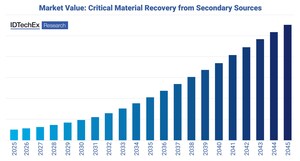BOSTON, Nov. 24, 2022 /PRNewswire/ -- IDTechEx's newly released report "Conductive Ink Markets 2023-2033" comprehensively explores this crucial material technology that underpins both photovoltaics and the emerging field of printed electronics. Based on interviews with over 30 companies, the report assesses the market for each of the 8 different conductive ink types across 15 different applications. Conductive ink types include flake-based silver, nanoparticle-based silver, copper, stretchable/thermoformable, and particle-free, while applications include photovoltaics, multiple types of printed sensors, flexible hybrid electronics (FHE), in-mold electronics (IME), and RFID/smart packaging. This detailed segmentation provides 39 distinct forecast lines, providing a clear picture of the status of the market for each ink type and future opportunities. The market as a whole is currently valued at US$2.7 billion and is forecast to grow to US$4.5 billion by 2033, with all this growth coming from emerging applications across printed/flexible/wearable electronics rather than from silicon photovoltaics.
Primary insight from interviews with individual players, ranging from established players to innovative start-ups, is included via over 30 detailed company profiles that include discussion of both technology and business model along with SWOT analysis. Additionally, the report includes analysis of conductive ink parameter space based on a database of over 100 conductive inks that includes curing time, conductivity, and viscosity. Together with the segmentation of suppliers by ink type, this should assist in gaining a comprehensive picture of the global conductive ink market.
Technical Developments
Flake-based conductive inks are a longstanding technology widely used for metalizing the upper surface of photovoltaic panels for charge extraction. However, this market is unlikely to keep up with the growth in PV panels, with new technologies developing to reduce the amount of silver ink required. Instead, much of the growth will come from emerging applications across the printed flexible electronics space.
This broadening of the application space creates opportunities for emerging conductive ink formulations that aim to meet specific application requirements:
- Particle-free conductive inks are metalized in situ, producing a smooth, thin conductive layer ideally suited to high-frequency EMI shielding and antennas. The very low viscosity also makes these inks ideally suited to high-resolution deposition techniques such as aerosol printing.
- Nanoparticle-based conductive inks offer higher conductivity, enabling more compact circuit designs.
- Liquid metal gel makes an ideal stretchable ink since there is no increase in resistance over time - the conductive liquid flows to accommodate the dimensional change. It is primarily targeted at wearable strain sensors.
- Copper-based inks with additives that prevent oxidation during sintering. These are gaining significant traction, with major electronics manufacturers running qualification projects. Copper inks are especially suitable where cost is the main driver, such as RFID/smart packaging antennas.
Application Opportunities
As a platform technology for printed electronics, conductive inks can be utilized in a remarkably wide range of applications, spanning market verticals ranging from healthcare to energy. This report divides the conductive ink application space into 15 segments, each outlining:
- Introduction to the application.
- Assessment of technological and commercial status.
- Conductive ink requirements for that specific application.
- Examples of conductive inks targeting that application.
- Market forecast, including the adoption of different ink types where appropriate.
Due to the potential for both rapid growth and specialist ink requirements enabling differentiation, some of the most promising conductive ink applications are electronic skin patches, strain sensors, and in-mold electronics (IME).
Outlook
The growth in printed/flexible/hybrid electronics, especially where it enables new applications and even business models, such as electronic skin patches for remote health monitoring and smart packaging, will drive the growth of the conductive ink market over the next decade. Furthermore, many emerging applications, such as in-mold electronics, e-textiles, and high-frequency antennas, have specific ink requirements that provide an opportunity for differentiation.
Key Questions Answered in This Report
- What types of conductive inks are produced by each supplier?
- How will rising silver prices impact the conductive ink market?
- What are the requirements for each conductive ink application, and how much ink is used in each?
- What is the technological and market readiness of each conductive ink application?
- What are the key growth opportunities where there is scope for differentiation?
- Who are the key players producing each type of ink?
IDTechEx has 20 years of expertise covering printed and flexible electronics, including conductive inks. IDTechEx's analysts have closely followed the latest developments in the technology and associated markets by interviewing many conductive ink suppliers and users and attending multiple printed electronics conferences such as LOPEC and FLEX annually. This report provides a complete picture of the fragmented conductive ink landscape, helping to inform product development and positioning.
To find out more about the new IDTechEx report "Conductive Ink Markets 2023-2033", including downloadable sample pages, please visit www.IDTechEx.com/ink.
About IDTechEx
IDTechEx guides your strategic business decisions through its Research, Subscription and Consultancy products, helping you profit from emerging technologies. For more information, contact research@IDTechEx.com or visit www.IDTechEx.com.
Images Download:
https://www.dropbox.com/scl/fo/5fhlib80qp9yug8adhpce/h?dl=0&rlkey=c0vpuz88n4k8w60nivn435k97
Media Contact:
Lucy Rogers
Sales and Marketing Administrator
press@IDTechEx.com
+44(0)1223 812300
Social Media Links:
Twitter: www.twitter.com/IDTechEx
LinkedIn: www.linkedin.com/company/IDTechEx
Facebook: www.facebook.com/IDTechExResearch
Photo: https://mma.prnewswire.com/media/1953512/IDTechEx_Conductive_Ink.jpg
Logo: https://mma.prnewswire.com/media/478371/IDTechEx_Logo.jpg





Share this article